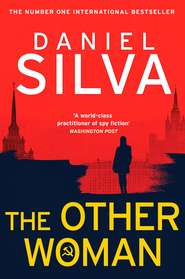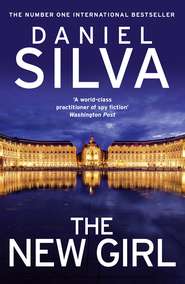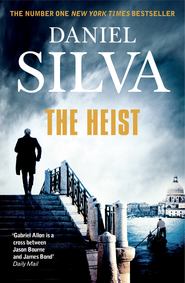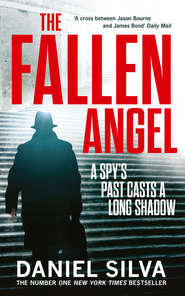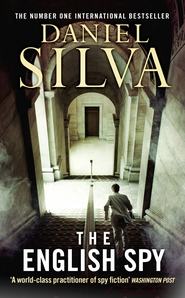По всем вопросам обращайтесь на: info@litportal.ru
(©) 2003-2024.
✖
The English Girl
Автор
Год написания книги
2018
Настройки чтения
Размер шрифта
Высота строк
Поля
“Things like dead bodies?”
The don shrugged. “They are an unfortunate byproduct of our business,” he said philosophically. “Usually, we try to leave them where they fall. But sometimes the clients pay a bit extra to make them disappear forever. Our preferred method is to put them into concrete coffins and send them to the bottom of the sea. Only God knows how many are down there.”
“How much did Paul pay?”
“A hundred thousand.”
“What was the split?”
“Half for me, half for the man with the boat.”
“Only half?”
“He’s lucky I gave him that much.”
“And when you heard the English girl had gone missing?”
“Obviously, I was suspicious. And when I saw Paul’s picture in the newspapers …” The don’s voice trailed off. “Let’s just say I wasn’t pleased. The last thing I need is trouble. It’s bad for business.”
“You draw the line at kidnapping young women?”
“I suspect you do, too.”
Gabriel said nothing.
“I meant no offense,” the don said genuinely.
“None taken, Don Orsati.”
The don loaded his plate with roasted peppers and eggplant and doused them in Orsati olive oil. Gabriel drank some of the wine, paid a compliment to the don, and then asked for the name of the man with the fast boat who knew the local waters. He did so as if it were the furthest thing from his thoughts.
“We’re getting into sensitive territory,” replied Orsati. “I do business with these people all the time. If they ever find out I betrayed them to someone like you, things would get messy, Allon.”
“I can assure you, Don Orsati, they will never know how I obtained the information.”
Orsati appeared unconvinced. “Why is this girl so important that the great Gabriel Allon is looking for her?”
“Let’s just say she has powerful friends.”
“Friends?” Orsati shook his head skeptically. “If you’re involved, there’s more to it than that.”
“You are very wise, Don Orsati.”
“The macchia has no eyes,” the don said cryptically.
“I need his name,” Gabriel said quietly. “He’ll never know where I got it.”
Orsati picked up his glass of the bloodred wine and lifted it to the sun. “If I were you,” he said after a moment, “I’d talk to a man named Marcel Lacroix. He might know something about where the girl went after she left Corsica.”
“Where can I find him?”
“Marseilles,” replied Orsati. “He keeps his boat in the Old Port.”
“Which side?”
“The south, opposite the art gallery.”
“What’s the boat called?”
“Moondance.”
“Nice,” said Gabriel.
“I can assure you there’s nothing nice about Marcel Lacroix or the men he works for. You need to watch your step in Marseilles.”
“This might come as a surprise to you, Don Orsati, but I’ve done this a time or two before.”
“That’s true. But you should have been dead a long time ago.” Orsati handed Gabriel the talisman. “Put it around your neck. It wards off more than just the evil eye.”
“Actually,” replied Gabriel, “I was wondering whether you had something a bit more powerful.”
“Like what?”
“A gun.”
The don smiled. “I have something better than a gun.”
Gabriel followed the road until it turned to dirt, and then he followed it a little farther. The old goat was waiting exactly where Don Orsati had said it would be, just before the sharp left-hand turn, in the shade of three ancient olive trees. As Gabriel approached, it rose from its resting place and stood in the center of the narrow track, its chin raised defiantly, as if daring Gabriel to attempt to pass. It had the markings of a palomino and a red beard. Like Gabriel, it was scarred from old battles.
He inched the car forward, hoping the goat would surrender its position without a fight, but the beast stood its ground. Gabriel looked at the gun Don Orsati had given to him. A Beretta 9mm, it was lying on the front passenger seat, fully loaded. One shot between the goat’s battered horns was all it would take to end the standoff, but it was not possible; the goat, like the three ancient olive trees, belonged to Don Casabianca. And if Gabriel so much as touched one hair on its wretched head, there would be a feud, and blood would be spilled.
Gabriel tapped the car horn twice, but the goat did not budge. Then, sighing heavily, he climbed out and attempted to reason with the beast—first in French, then Italian, and then, exasperated, in Hebrew. The goat responded by lowering its head and aiming it like a battering ram toward Gabriel’s midsection. But Gabriel, who believed the best defense was a good offense, charged first, flailing his arms and shouting like a madman. Surprised, the goat gave ground instantly and vanished through a gap in the macchia.
Gabriel quickly started back toward the open car door but stopped when he heard a sound, like the cackling of a mockingbird, in the distance. Turning, he looked up toward the ocher-colored villa anchored to the side of the next hill. Standing on the terrace was a blond-haired man dressed entirely in white. And though Gabriel could not be certain, it appeared the man was laughing uncontrollably.
9 (#ulink_d8caf104-9e20-5d71-a6c5-ee517a25ee11)
CORSICA (#ulink_d8caf104-9e20-5d71-a6c5-ee517a25ee11)
THE MAN AWAITING Gabriel in the villa was not a Corsican—at least he had not been born one. His real name was Christopher Keller, and he had been raised in a solidly upper-middle-class home in the posh London district of Kensington. On Corsica, however, only Don Orsati and a handful of his men were aware of these facts. To the rest of the island, Keller was known simply as the Englishman.
The story of Christopher Keller’s journey from Kensington to the island of Corsica was one of the more intriguing Gabriel had ever heard, which was saying something in itself. The only son of two Harley Street physicians, Keller had made it clear at an early age that he had no intention of following in his parents’ footsteps. Obsessed with history, especially military history, he wanted to become a soldier. His parents forbade him to enter the military, and for a time he acceded to their wishes. He enrolled at Cambridge and began reading history and Oriental languages. He was a brilliant student, but in his second year he grew restless and one night vanished without a trace. A few days later he surfaced at his father’s Kensington home, hair cut to the scalp, dressed in an olive-drab uniform. He had enlisted in the British army.
After completing his basic training, Keller joined an infantry unit, but his intellect, physical prowess, and lone-wolf attitude quickly captured the attention of the elite Special Air Service. Within days of his arrival at the Regiment’s headquarters at Hereford, it became clear Keller had found his true calling. His scores in the “killing house,” an infamous facility where recruits practice close-quarters combat and hostage rescue, were the highest ever recorded, while the instructors in the unarmed combat course wrote that they had never seen a man who possessed such an instinctual knack for the taking of human life. His training culminated with a forty-mile march across the windswept moorland known as the Brecon Beacons, an endurance test that had left men dead. Laden with a fifty-five-pound rucksack and a ten-pound assault rifle, Keller broke the course record by thirty minutes, a mark that stands to this day.
Initially, he was assigned to a Sabre squadron specializing in mobile desert warfare, but his career soon took another turn when a man from military intelligence came calling. The man was looking for a unique brand of soldier capable of performing close observation and other special tasks in Northern Ireland. He said he was impressed by Keller’s linguistic skills and his ability to improvise and think on his feet. Was Keller interested? That same night Keller packed his kit and moved from Hereford to a secret base in the Scottish Highlands.
During his training, Keller displayed yet another remarkable gift. For years the British security and intelligence forces had struggled with the myriad of accents in Northern Ireland. In Ulster the opposing communities could identify each other by the sound of a voice, and the way a man uttered a few simple phrases could mean the difference between life and an appalling death. Keller developed the ability to mimic the intonations perfectly. He could even shift accents at a moment’s notice—a Catholic from Armagh one minute, a Protestant from Belfast’s Shankill Road the next, then a Catholic from the Ballymurphy housing estates. He operated in Belfast for more than a year, tracking known members of the IRA, picking up bits of useful gossip from the surrounding community. The nature of his work meant that he would sometimes go several weeks without contacting his control officers.






